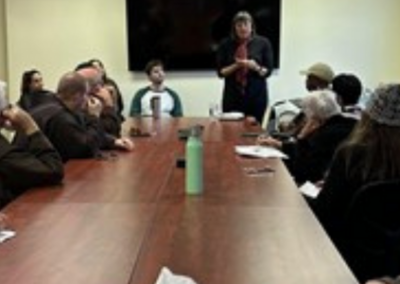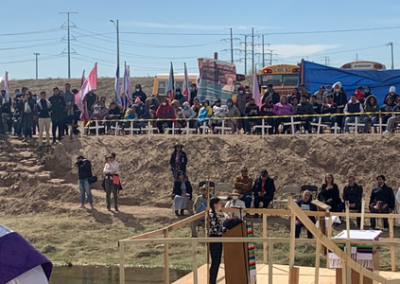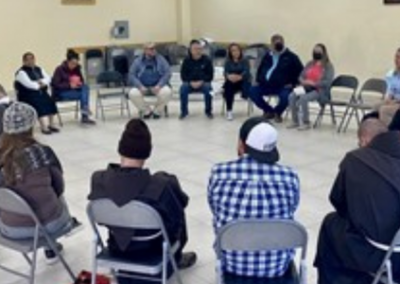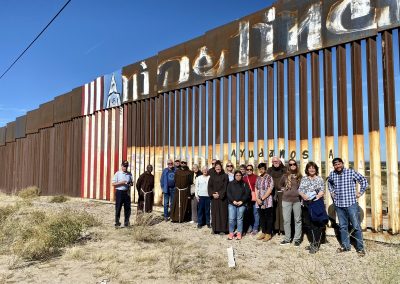I immediately noticed the Do Not Trespass signs as we were given permission by the Border Patrol to cross through the wall into “No Man’s Land” – the uninhabited region between Texas and Mexico.
As attendees of the Border Experience with the Franciscan Network for Migrants (FNM), we attended the annual Border Mass at the Rio Grande canal, celebrated by the Catholic church in El Paso and Ciudad Juárez. In a space that is typically closed off to practically everyone and stands as a token of the division and tension between the United States and Mexico, we beheld beautiful music and singing, indigenous dancing, and a diverse plethora of lay and religious men and women. We waved as a sign of greeting and friendship to those across the canal border, and they heartily waved back. A temporary wooden platform rested over the canal so that both sides could participate at the altar in the middle, which was very symbolic for me. We as the Church are called to be the bridge across the divides, and to point to a world – this one or the next – when we all be united.
As incredibly grateful as I am for all the blessings I have received as a citizen of the United States of America, I still dream of a world where we are not so divided by national boundaries that we cannot see the outsider as one of our own – a fellow member of the human race and a fellow child of God. I witnessed small pieces of this dream coming to life in my weekend immersion trip with FNM in early November this year. Twenty-something Franciscan-hearted folks from around the US and Mexico gathered to learn about the migration situation in El Paso/Ciudad Juárez and start brainstorming initiatives in order to contribute in a way that is truly beneficial and effective in this context.
We visited center after center, program after program, where staff and volunteers work diligently to make this vision of solidarity and care for the refugee and asylum-seeker a reality. Two of the stops that stood out most to me were Las Americas in El Paso and Casa Eudes in Ciudad Juárez.
Las Americas Immigrant Advocacy Center has been accompanying migrants and refugees and being the “eyes and ears behind bars in detention centers” for the last 35 years. The executive director, Marisa, and three of her staff members from Las Americas México (LAMX) sat with us at length to discuss their legal representation and advocacy work and answer all of our questions regarding legal processes for refugees and asylum-seekers. With branches in both the US and Mexico, they seek to welcome and care for all migrants, regardless of race, nationality, socioeconomic status, etc. At the migration peak in 2019, they were receiving around 4,000 calls a day – with just two receptionists on hand! There are 22 shelters in Ciudad Juárez, but we were told that, due to racism in Juárez, this is the only center that offers legal services to Haitian migrants. They also shared with us that an overwhelming 90-something percent of asylum cases are denied in El Paso! With no law schools available in the surrounding area, there are no local lawyers coming through the pipeline, resulting in a significant deficit of legal representatives in the region. (They are currently hiring attorneys if you know of anyone who would be interested and qualified for the job!)
Casa Eudes, run by the Good Shepherd Sisters, assists women and children who are migrating. The shelter was established many years ago to provide care and housing for girls and young women suffering from domestic violence locally, but it has shifted its focus to include migrant women and their children since many of them are fleeing violence in their different countries of origin. The Good Shepherd Sisters are like mothers to the women, showing them real love and care and watching how that changes them over time. The center holds workshops, provides medical care and psychological support, holds school for the kids, helps with legal paperwork, offers three meals a day, and takes the families out for mini-excursions. The women can stay at Casa Eudes for up to four months, and the staff shared with us that their departure days are always very emotional. They told us that they have housed 500 migrant persons so far and accompanied 480 of those women and children to the US/Mexico border to be legally received by their sponsors. The place seemed so lovely and genuine that I actually thought about possibly volunteering or working there at some point in the future!
In his Border Mass homily, El Paso Bishop Mark Seitz encouraged us “to work for that world that we envision.” One human race, a community of brothers and sisters, members of one family. I feel inexpressibly grateful for all the workers and volunteers whom I met and spoke with during the Border Experience. These individuals – many of whom are doing things that I could never do – are steadfastly and courageously working and fighting for justice and equitable treatment of all human beings. My immersion weekend with the Franciscan Network for Migrants reminded me that we each bring our talents and skills, contributing a small but significant part to the collective goal of humane and just treatment for all.
Julia Pinto, Franciscan Missioner





